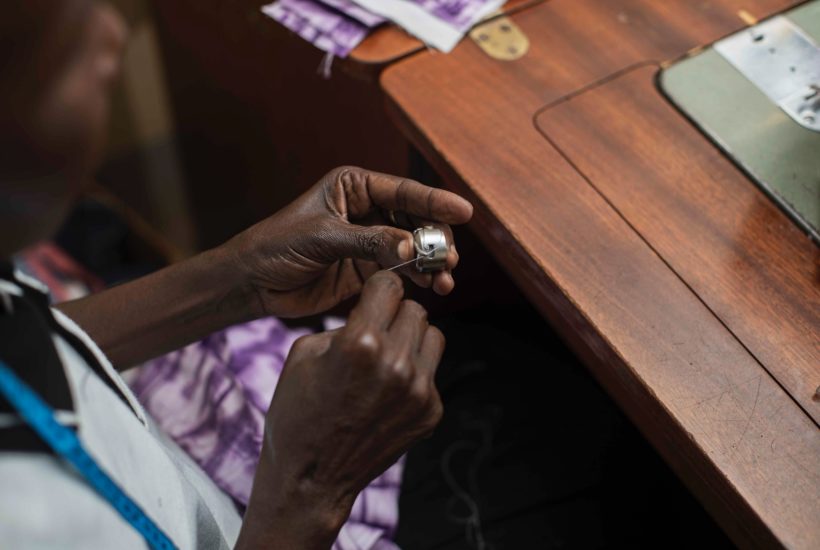Africa
Artisans in Morroco Challenged by the Pandemic
Several projects, intended to mitigate the impact of the health crisis on artisans, are included in the Finance Act 2022. They follow the establishment of the National Register of the artisan and the expansion of social coverage to this socio-professional category. On the thorny issue of improving the working conditions of artisans, it is planned to implement several requirements of the law on decent work.

The handicraft sector, which was heavily affected by the pandemic, will benefit from several support instruments in 2022, with the aim of succeeding in the challenge of recovery. The dependence of craft activities on the tourism sector, which has just been provided with an emergency plan, will be salvageable for the professionals concerned, especially to encourage demand. It should be said that after the approval in December 2021, the new implementing regulations of Law 50-17 on the status of the artisan, the recognition of all activities related to the sector will be operated. This will allow hundreds of thousands of workers in the sector to finally adhere to the social coverage. One of the main projects to be conducted, to this end, during the first half of this year 2022, will be the establishment of an updated database to integrate into the sector certain categories of trades not yet recognized.
Read more on the subject and find other important economic news with the Born2Invest mobile app.
In addition to the classification of crafts in two main areas, the requirements for registration in the National Register of Crafts will apply gradually
This is to say that the law on these activities will be the main mechanism to be deployed to integrate the categories previously excluded from the National Register of the artisan. In addition, the current year will be characterized by the implementation of several priorities, outlined by the Regional Plans of craft, with an upgrade of the entire value chain of trades and industries targeted. The objective is “to develop craft products with strong cultural content and restructure the productive fabric,” said the sectoral roadmap validated by the Finance Act 2022. Among other priorities, is also “the promotion of sales on new markets, especially for some regions with a tourist vocation.”
On the thorny issue of improving the working conditions of artisans, it is planned to implement several requirements of the law on decent work, and the redesign of the training process. The status of several trades will be revised for this purpose, including those of master craftsman and assistant craftsman. Several transparency requirements will be imposed, also, to legal persons involved in the sector, whether cooperatives or companies. In addition, the regional plans will be essential mechanisms to enable artisans to access funding at preferential rates or to obtain assistance for digital marketing. It should be noted that the deployment of the process of adoption of the Development Plans of the craft sector has been hit hard by the health crisis. These plans remain, however, among the alternatives most likely to mitigate the impact on activities. For the moment, the establishment of the National Register of Craftsmen seems to be the appropriate channel through which all artisans could benefit from the contribution of the regional approach. As a reminder, a vast operation of labeling is still underway. It aims to draw up the list of production units having passed the audit required by the right to use the label. The said audit is intended to certify the ability of the units concerned to “produce according to quality standards required by law and regulations on consumer protection.
The pivotal role of chambers of crafts
The sectoral roadmap relies, to a large extent, on the contribution of professional chambers in the revival of activities, including the targeting of subsidies granted. The chambers of crafts receive an annual allocation of 22 MDH, to cover their operating costs and investment. Note that in addition to the Ministry of supervision, the House of Crafts also contributes to these grants. For its part, the steering committee of the National Strategy of the craft is a crucial component for the implementation of the contract program. In the same register, the target relating to the segment of vocational training should reach, in 2021, 65,370 apprentices in the trades of the craft, and this for a budget of 341 MDH. Under their new status, the chambers of crafts are a pivot between young people and craft enterprises, intervening in the content of programs and facilitating exchanges.
__
(Featured Image by Ugandan Crafts via Unsplash)
DISCLAIMER: This article was written by a third party contributor and does not reflect the opinion of Born2Invest, its management, staff or its associates. Please review our disclaimer for more information.
This article may include forward-looking statements. These forward-looking statements generally are identified by the words “believe,” “project,” “estimate,” “become,” “plan,” “will,” and similar expressions. These forward-looking statements involve known and unknown risks as well as uncertainties, including those discussed in the following cautionary statements and elsewhere in this article and on this site. Although the Company may believe that its expectations are based on reasonable assumptions, the actual results that the Company may achieve may differ materially from any forward-looking statements, which reflect the opinions of the management of the Company only as of the date hereof. Additionally, please make sure to read these important disclosures.
First published in LES ECO.ma, a third-party contributor translated and adapted the article from the original. In case of discrepancy, the original will prevail.
Although we made reasonable efforts to provide accurate translations, some parts may be incorrect. Born2Invest assumes no responsibility for errors, omissions or ambiguities in the translations provided on this website. Any person or entity relying on translated content does so at their own risk. Born2Invest is not responsible for losses caused by such reliance on the accuracy or reliability of translated information. If you wish to report an error or inaccuracy in the translation, we encourage you to contact us.

-

 Impact Investing2 weeks ago
Impact Investing2 weeks agoEU Eases CO2 Tax Burden on SMEs with Revised CBAM Rules
-

 Fintech2 days ago
Fintech2 days agoRobinhood Expands to Europe with Tokenized Stocks and Perpetual Futures
-

 Business1 week ago
Business1 week agoAmerica’s Debt Spiral: A $67 Trillion Reckoning Looms by 2035
-

 Crowdfunding6 days ago
Crowdfunding6 days agoTasty Life Raises €700,000 to Expand Pedol Brand and Launch Food-Tech Innovation
























